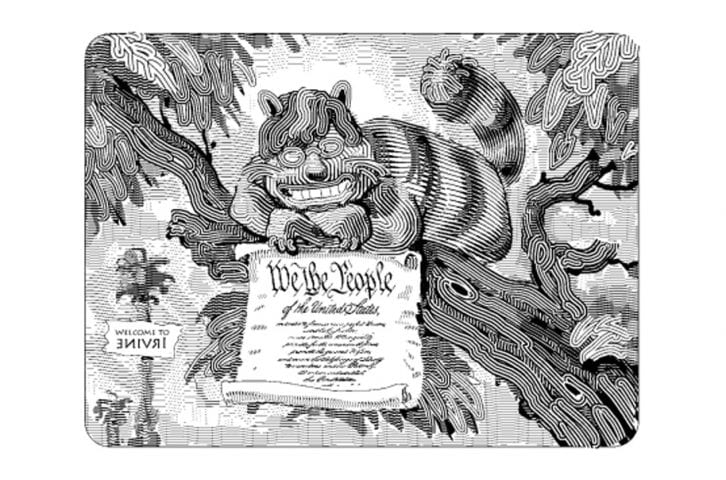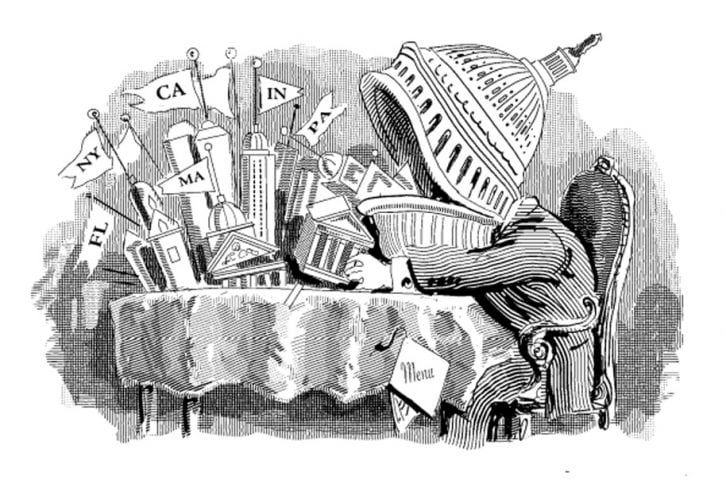Groucho Marx sang it in at the circus in 1939, and the young Virginia Weidler, playing Dinah Lord, sang it in the great movie The Philadelphia Story a year later. It was already a classic. I mean Harold Arlen and Yip Harburg's "Lydia the Tattooed Lady":
Lydia, oh Lydia, say have you met Lydia,
Lydia, the Tattooed Lady.
She has eyes that folks adore so,
And a torso even more so.
Lydia, oh Lydia, that encyclopidia,
Oh Lydia the Queen of Tattoo.
On her back is the Battle of Waterloo,
Beside it the wreck of the Hesperus, too.
And proudly above waves the Red, White, and Blue,
You can learn a lot from Lydia.
The final stanza contained a line that Groucho didn't use, apparently because the producers feared the song would sound too dated.
When she stands up her lap will get lit'ler,
When she sits down, she sits down on Hitler.
They shouldn't have worried. Hitler was going to be around for a while.
The same can be said, in all likelihood, of Colonel Muammer Gaddhafi in Libya. I don't mean that his face has replaced Hitler's on Lydia's tattooed derriere, though that would be the right place for it—always assuming one could devise a good rhyme for Gaddhafi. Come to think of it, the colonel looks and dresses rather like a tattooed lady himself. He long ago achieved self-parody, and in his press conferences you half expect him to break out mugging and singing like Groucho, though without the manly moustache. It would be easy to treat the sandbox dictator as a bad joke, were it not for the murderousness that clings to his robes. Despite NATO's and the Libyan rebels' continuing efforts, Gaddhafi doesn't appear to be exiting the scene anytime soon. In fact, if he can evade the bombs until autumn he has a good chance of outlasting NATO's campaign against him, which is already running out of ammunition, weapons, money, patience, and pluck, not necessarily in that order. France says the British could do more. Britain says it's stretched already, and where are the Germans and the Poles? Brussels admits that NATO has flown "only one-third the number of air sorties over Libya that it did over Kosovo" in the same amount of time, "and hit only a fraction of the targets," according to the Financial Times. Everyone points to the Americans, who are "leading from behind" and refusing to commit warplanes to bombing missions after an initial flurry of air-superiority and other strikes. The Americans retort, as Secretary of Defense Robert Gates put it in his farewell address to NATO, that "the mightiest military alliance in history is only 11 weeks into an operation against a poorly armed regime in a sparsely populated country" and already its European members are winded and looking desperately at the game clock.
* * *
In fairness, the alliance has doubled its troops in Afghanistan, from 20,000 in 2006 to 40,000 today, though many are not in combat roles and most of their governments, including the U.K., are eager to bolt for the door. Libya, a war in their neighborhood, with widespread public support, and not involving ground troops, should be a far easier undertaking. But the combination of a lack of resources and a lack of will is crippling the alliance. Despite the "hot" war in Afghanistan, total European defense spending declined by nearly 15% in the decade since 9/11. The U.S. always took the lead in NATO defense outlays, but as a result of our partners' cutbacks our role has grown by default. During the Cold War, the American share of NATO military spending was 50%; today, our share has soared to more than 75%.
Like America but more so, European governments have allowed the rising costs of the welfare state, including the costs of sovereign debt maintenance, to squeeze out defense spending over several decades. That process is about to accelerate, as deficits, debt, and unfunded liabilities tighten their grip on Western economies. The Libyan War is a presage of what Gates calls, diplomatically, "the very real possibility of collective military irrelevance." Leaving aside the wisdom of this intervention, its execution raises troubling questions about the future of the West. Great powers that lightly undertake wars they prove unable or unwilling to win, soon become former great powers. Our European friends consoled themselves on their decline, and even took pride in it, by persuading themselves that the end of history was at hand—that nationalism, war, and economic panic were things of the past. And if they were wrong, well, the Americans would be there to help them. If we expect the Red, White, and Blue to continue waving proudly, we'd better learn a lot from Libya.


